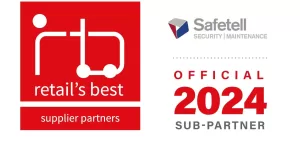What Are The Risks of Handling Cash?
03 December, 2024
Although businesses and other organisations are increasingly moving towards cashless operations, cash is still handled regularly across retail and other commercial settings. Cash handling has always been a potential security weak spot, with companies needing to have safeguards in place to address a range of potential risks.
If employees within your organisation regularly handle cash, then it’s essential that you understand the risks. A cash handling risk assessment should be carried out and cash handling best practices need to be followed to reduce the risk.
Handling money at work: What are the risks?
There are several potential risks that occur when cash is handled in the workplace, from theft and fraud, unintentional mistakes, miscounting, and discrepancies.
Sadly, fraudulent activities can and do take place during cash handling, such as skimming from the till or creating false transactions. Even unintentional errors, such as miscounting change or entering incorrect amounts into tills may result in financial discrepancies. If these occur regularly, the reputation of a business can suffer.

When cash is being handled in customer facing settings there is an increased risk of robbery or theft. This is particularly the case if large amounts of cash are visible. Secure counters and screens are crucial to protect employers from criminals when handling cash.
Inadequate security or poorly executed cash handling procedures can increase the risk of theft. Another potential weak point in a company’s security is when cash is being transported, either within the building, or to other locations. If inadequate security measures are not put in place, then the risk of theft increases.
What can companies do to reduce the risk of cash handling theft, fraud, or mistakes?

How can I improve my cash handling?
There are a number of cash handling best practices that employees and business owners can incorporate to reduce the risk of fraud, theft, and mistakes:
- Ensure accurate counting: Always double check cash counts during transactions to ensure accuracy.
- Follow company procedures: Always follow established cash handling procedures, including storage, logging, and reconciliation.
- Keep organised: Cash should be neatly arranged in the till or register, making sure that denominations are separated to reduce payment handling errors.
- Reduce distractions: Focus on each transaction, minimising potential distractions, interruptions, and the temptation to multitask.
- Follow secure practices: Always follow secure protocols when transporting money and keep movements of cash discreet.
- Verify authenticity: Learn to recognise counterfeit currency and get to know the security features of legitimate notes.
- Regular reconciliations: Cash drawers should be reconciled regularly to catch any discrepancies.
- Use technology: Use technology such as point-of-sale (POS) systems to track transactions and reduce the risk of manual errors.
- Keep alert: Any employee handling cash should always remain alert for suspicious activity and potential security threats, especially when working in a customer-facing environment or transporting cash.
- Proper training: Employees with cash handling responsibilities should receive appropriate training, including secure procedures and fraud prevention.
- Report issues promptly: Any discrepancies or concerns should be reported immediately so that issues can be addressed quickly and transparently.
What is the best practice for handling cash?
During cash handling, employees should work to maintain accuracy and accountability, while following secure procedures throughout. Cash should always be counted carefully and its authenticity verified to minimise potential errors.
Secure handling requires cash handling to be carried out discreetly, ensuring that access is restricted to authorised personnel. Locked safes and cash drawers should be used, along with secure counters in public facing areas.
Companies should have established cash handling procedures that are based on best practices and well understood. Employees with cash handling responsibilities should receive appropriate training to help them carry out their role.
Comprehensive commercial security from Safetell
At Safetell, our experienced team can help ensure that the risks around cash handling are reduced and effectively managed. Our unique portfolio of products and services have been developed to meet the evolving needs of our clients.
They have been tried and tested for over 30 years and are designed to provide full comprehensive levels of protection for employees and company assets, protecting against attacks, intrusions and theft.
Contact us to discuss your security requirements and to find out more about our products.












